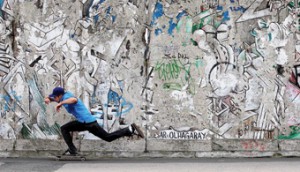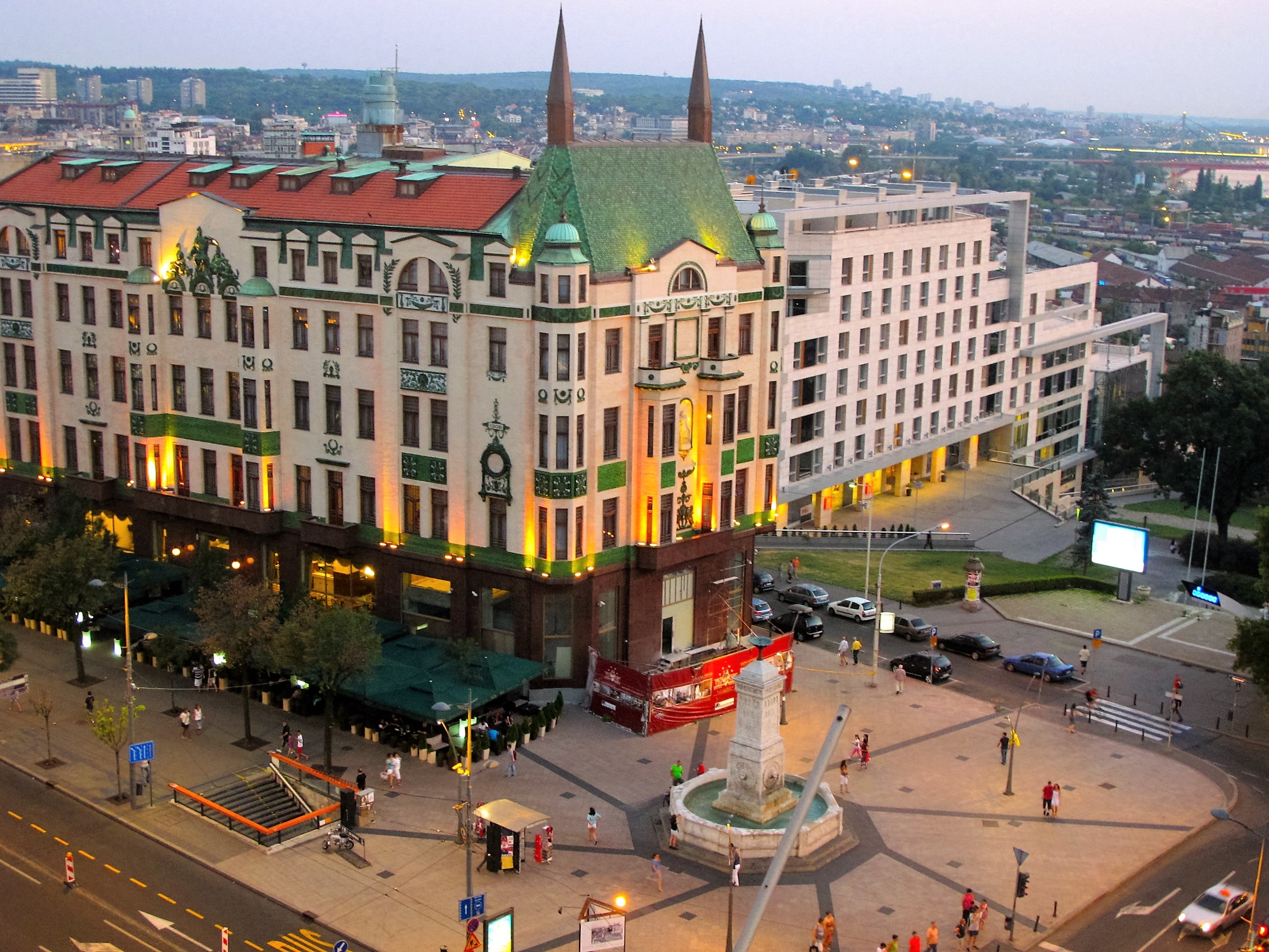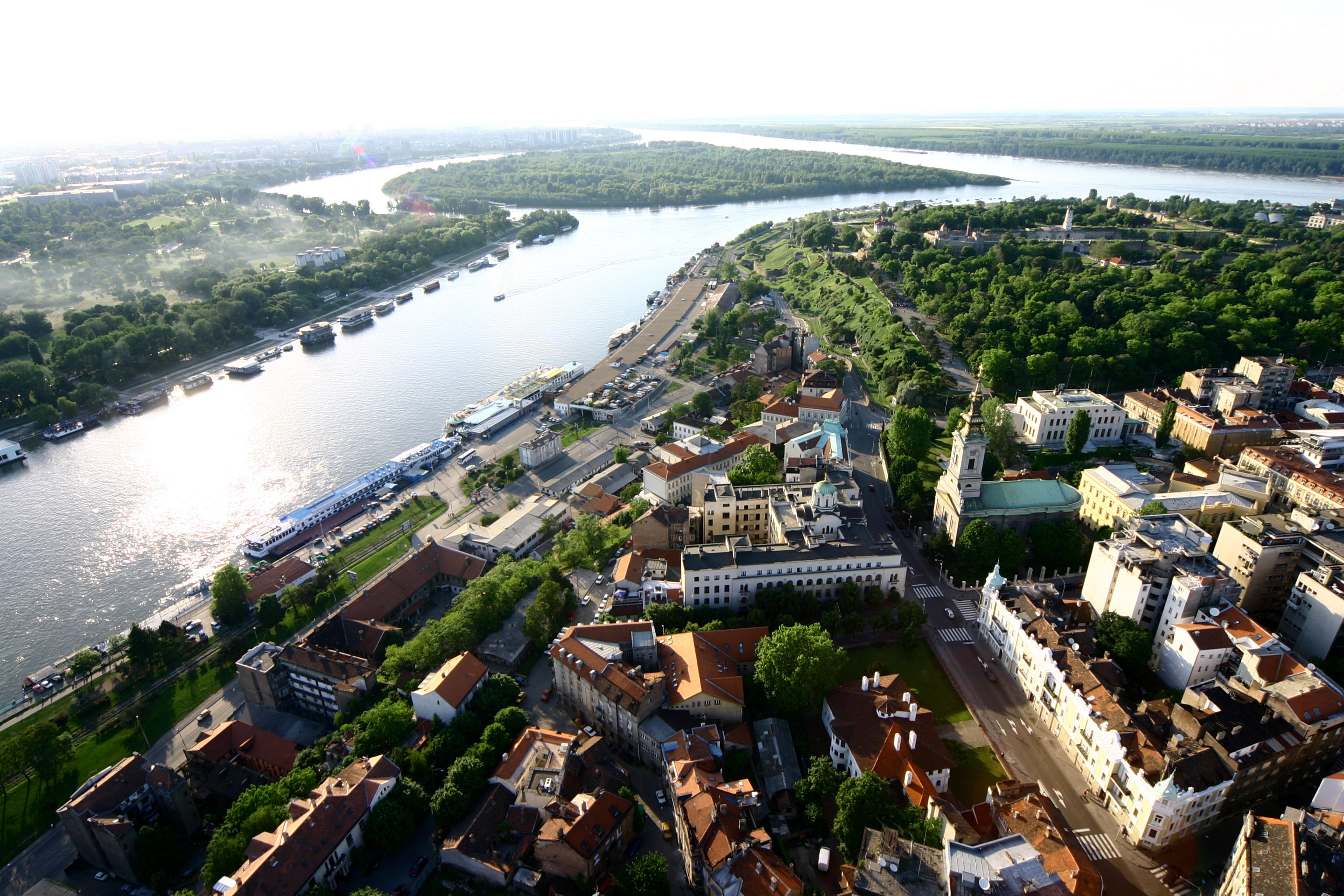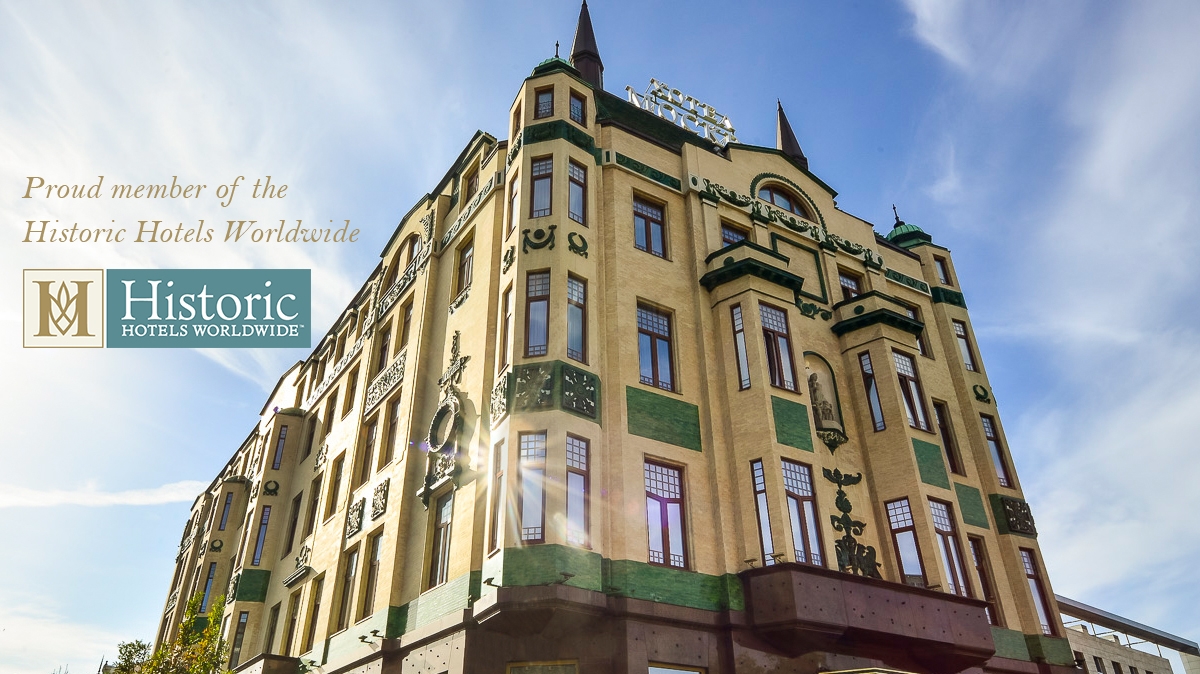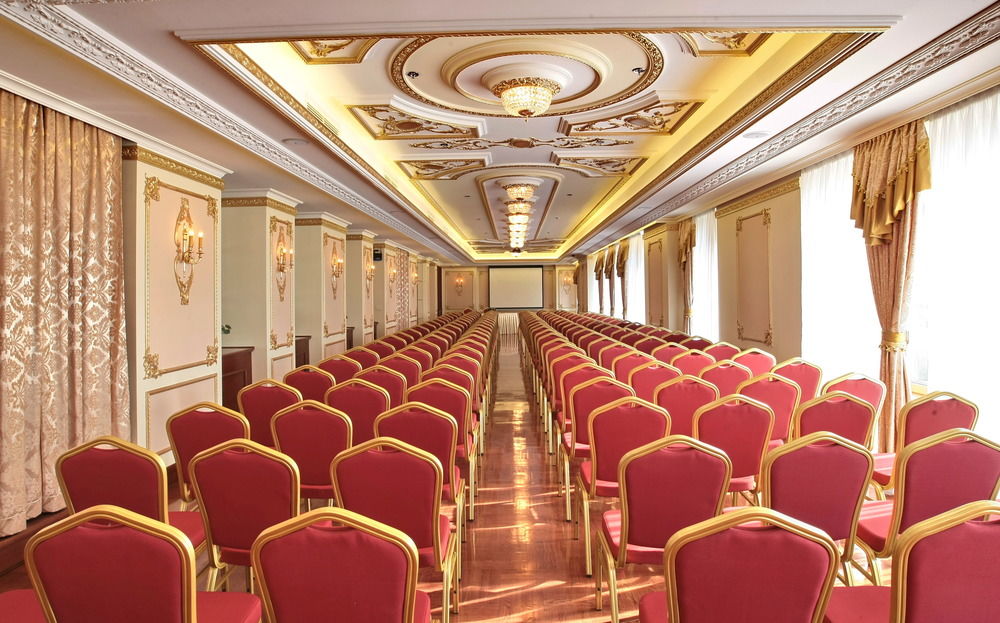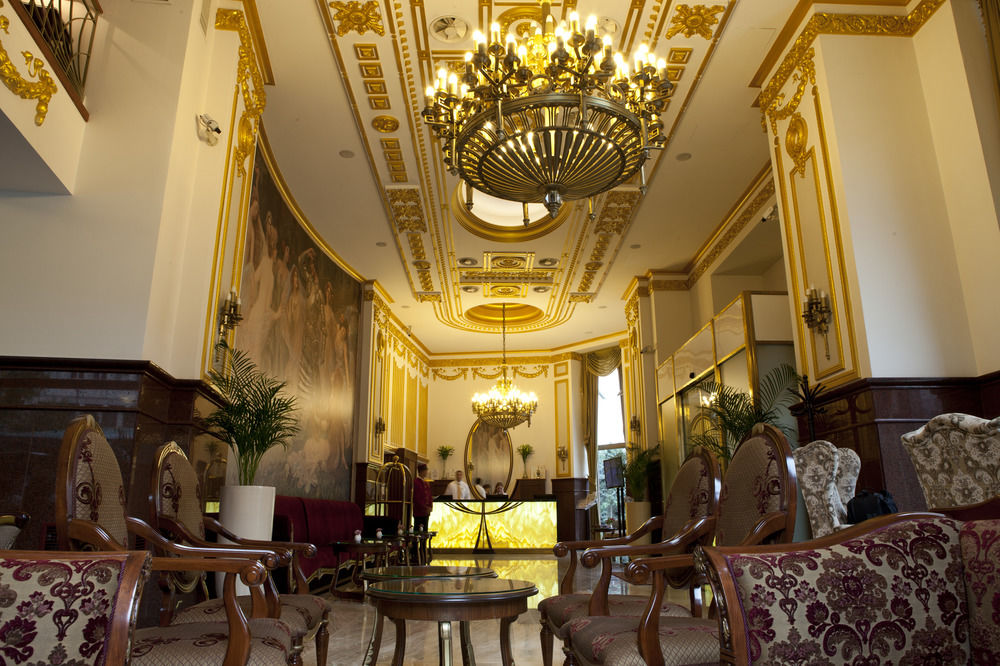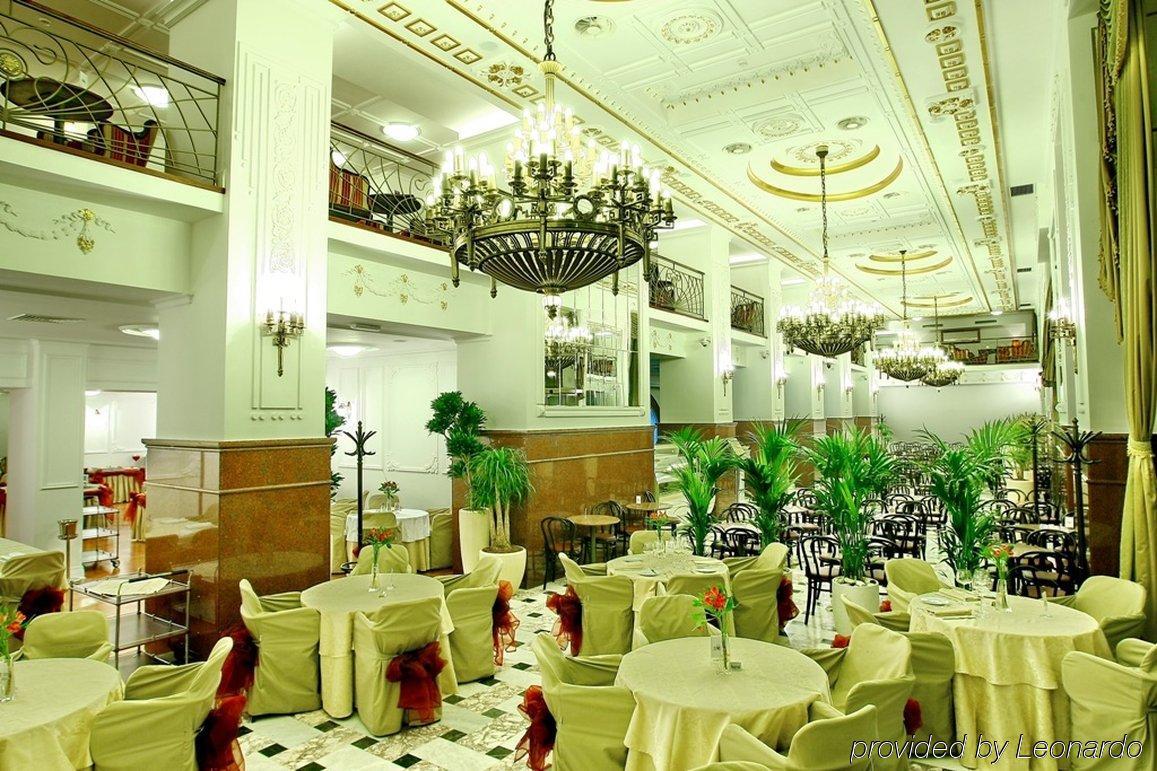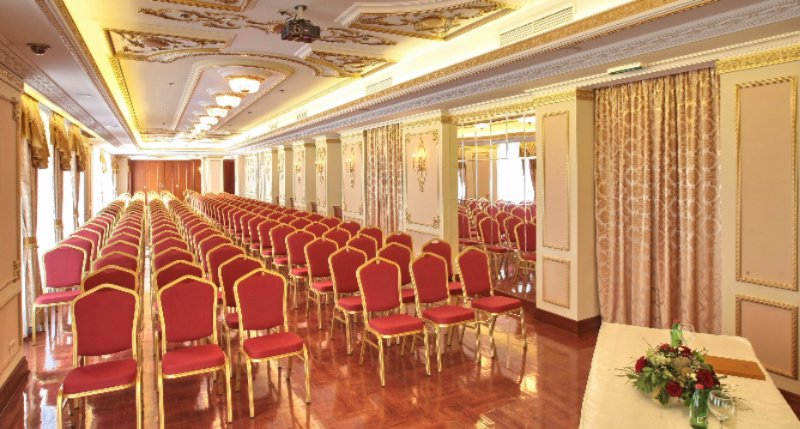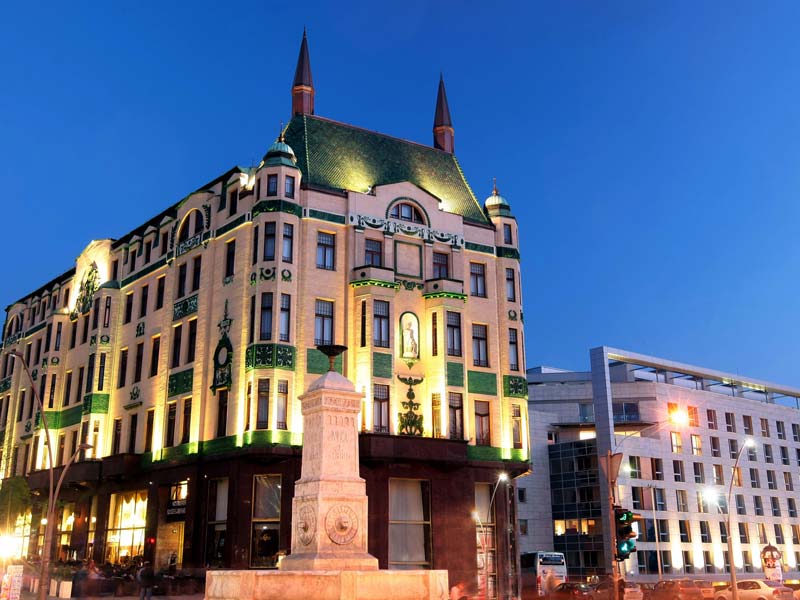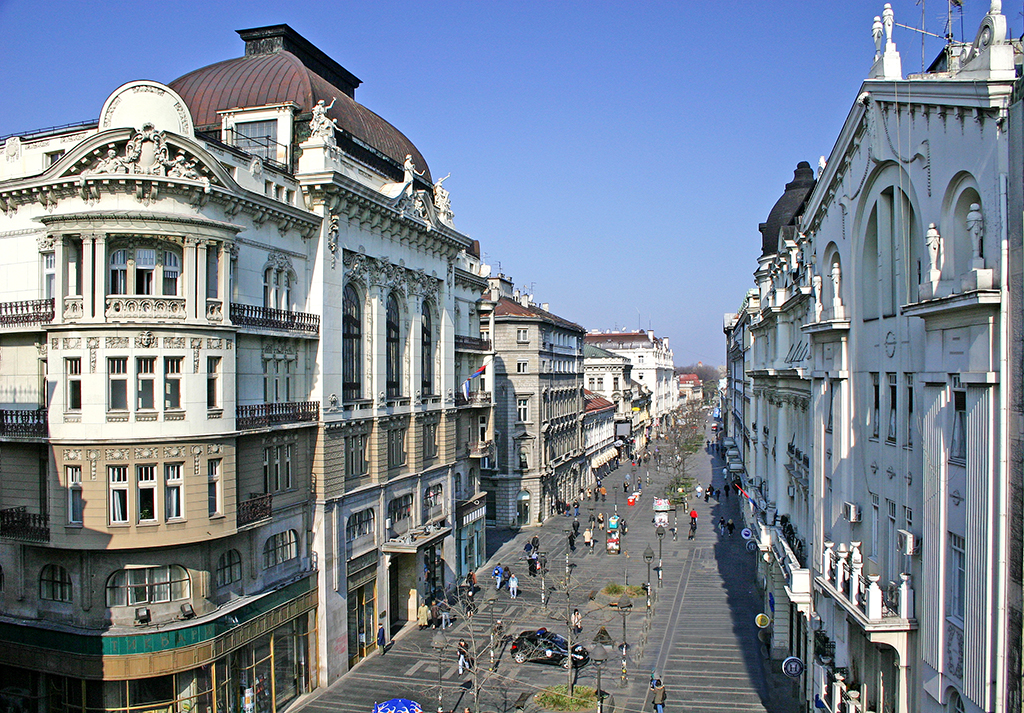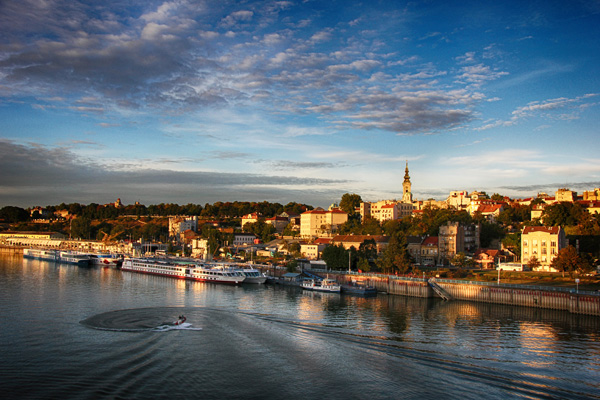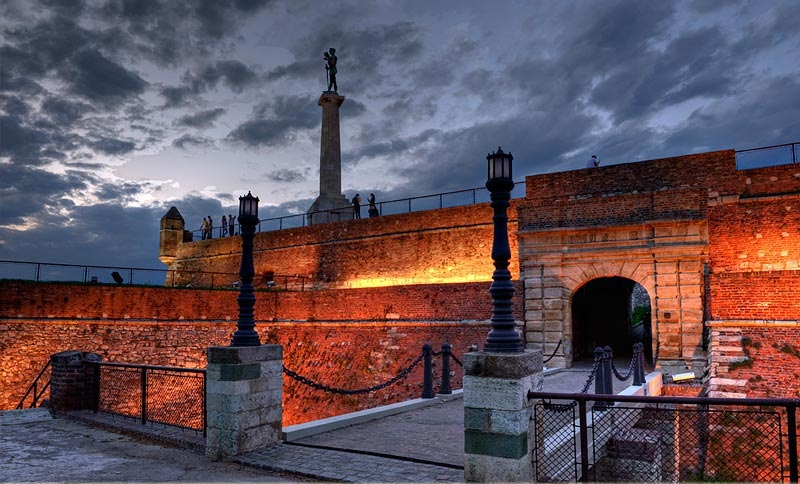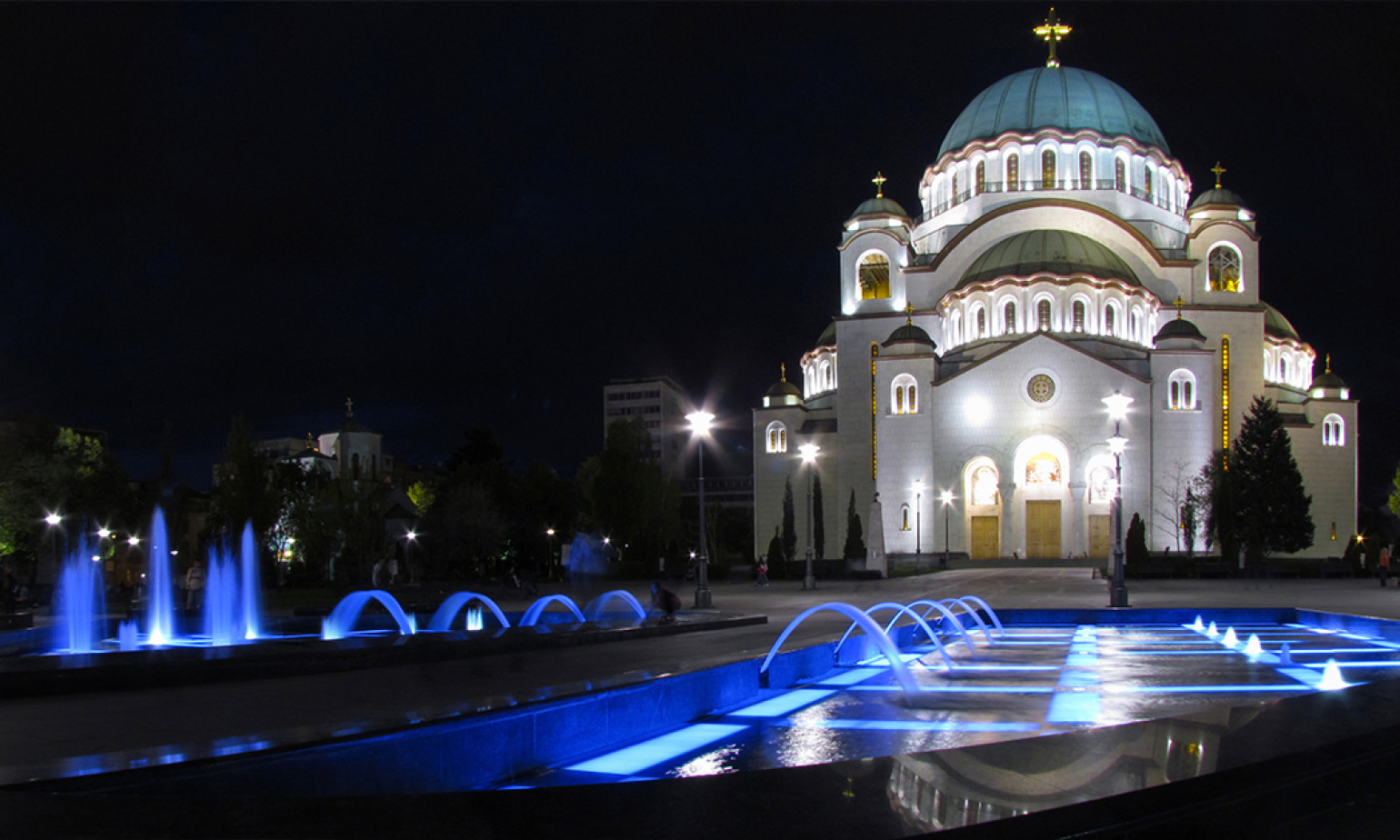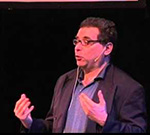Moskva Hotel
Conference Room: Moskva
Terazije 20 11000 Belgrade Serbia
Conference Program
- January 27, 2017
- 08:30 - 09:00Participant's Registration (Registration Desk)
- 09:00 - 09:30Welcome and Opening Remarks - Opening Workshop: Re-Inventing Eastern Europe
- 09:30 - 10:30Keynote Presentation: Itai Sneh (City University of New York, USA) - Cold War and Helsinki: Eastern Europe Defined by Human Rights
- 10:30 - 11:00Coffee Break and Snacks (Conference Room Space - Foyer)
- 11:00 - 13:00Panel 1 – The Persisting Imaginary Dichotomy of Eastern/Western Europe with Its Axiological Categories and Perceptions
- 13:00 - 14:30Lunch – Moskva Hotel Restaurant
- 14:30 - 16:30Panel 2 – Visual Urban Transformations: Transition and Change in Urban Image Construction in Central and Eastern Europe
- 16:30 - 17:00Coffee Break and Snacks (Conference Room Space - Foyer)
- 17:00 - 19:00Panel 3 – Art as Cultural Diplomacy: (Re)Constructing Notions of Eastern and Western Europe
- 19:00 - 19:45Welcome Drink Out in Belgrade
- 19:45 - 21:00Optional Social Dinner in a Typical Serbian Cuisine Restaurant
- January 28, 2017
- 09:00 - 10:30Panel 4 – Readings of the Past: On Memory, Remembrance and Memorialization in Central and Eastern Europe
- 10:00 - 11:00Coffee Break and Snacks (Conference Room Space - Foyer)
- 11:00 - 13:00Panel 5 – Genealogies of Othering: The Path from Alterity Making Practices through Myth and Religion to Secularism and Tolerance
- 13:00 - 14:30Lunch – Moskva Hotel Restaurant
- 14:30 - 16:30Panel 6 – Central East European Economies: Trade, Development and Structural Change in the Region
- 16:30 - 17:00Coffee Break and Snacks (Conference Room Space - Foyer)
- 17:00 - 19:00Panel 7 – The Process of Europeanization in CEE: Crisis, Migration, European Integration and Possibilities of Regional Cooperation
- 19:00 - 19:30Closing Session
- 19:30 - 21:00Optional Social Dinner in a Typical Serbian Cuisine Restaurant
- January 27, 2017
Re-Inventing Eastern Europe (The 6th Edition)

- Conference Description
- Participant’s Profile
- Registration and Fee
- Social Activities and Publication
- Important Dates
- Venue and Directions
- Conference Program
- Keynote Presentation
- Panel 1
- Panel 2
- Panel 3
- Panel 4
- Panel 5
- Panel 6
- Panel 7
The 6th Euroacademia International Conference
Re-Inventing Eastern Europe
27 – 28 January 2017
Moskva Hotel, Belgrade, Serbia
Keynote Speaker: Itai Sneh (John Jay College, The City University of New York)
Keynote Speaker: Itai Sneh (John Jay College, The City University of New York)
Conference Description
Not a long time ago, a British lady was considered bigoted by Gordon Brown upon asking ‘all these Eastern Europeans what are coming in, where are they flocking from?’(1). The zoological word is not a novelty in the cultural invention of Eastern Europe. Maybe, despite her concern with the dangers of immigration for Britain, the lady was right in showing that such a question still awaits for answers in Europe. The ironic aspect however is that a first answer to such a question would point to the fact that the Eastern Europeans come from the Western European imaginary. As Iver Neumann puts it, ‘regions are invented by political actors as a political program, they are not simply waiting to be discovered’(2). And, as Larry Wolff skilfully showed, Eastern Europe is an invention emanated initially from the intellectual agendas of the elites of the Enlightenment that later found its peak of imaginary separation during the Cold War(3).
The Economist, explicitly considered Eastern Europe to be wrongly labelled and elaborated that ‘it was never a very coherent idea and it is becoming a damaging one’(4). The EU enlargement however was expected to make the East/West division obsolete under the veil of a prophesied convergence. That would have finally proven the non-ontological, historically contingent and unhappy nature of the division of Europe and remind Europeans of the wider size of their continent and the inclusive and empowering nature of their values. Yet still, more than 20 years after the revolutions in the Central and Eastern European countries, Leon Mark, while arguing that the category of Eastern Europe is outdated and misleading, bitterly asks a still relevant question: ‘will Europe ever give up the need to have an East?’(5)
Eastern Europe was invented as a region and continues to be re-invented from outside and inside. From outside its invention was connected with alterity making processes, and, from inside the region, the Central and Eastern European countries got into a civilizational beauty contest themselves in search of drawing the most western profile: what’s Central Europe, what’s more Eastern, what’s more Ottoman, Balkan, Byzantine, who is the actual kidnapped kid of the West, who can build better credentials by pushing the Easterness to the next border. A wide variety of scholars addressed the western narratives of making the Eastern European ‘other’ as an outcome of cultural politics of enlightenment, as an effect of EU’s need to delineate its borders, as an outcome of its views on security, or as a type of ‘orientalism’ or post-colonialism. Most of these types of approaches are still useful in analyzing the persistence of a East-West slope. The region is understood now under a process of convergence, socialization and Europeanization that will have as outcomes an ‘ever closer union’ where the East and the West will fade away as categories. Yet the reality is far from such an outcome while the persistence of categories of alterity making towards the ‘East’ is not always dismantled. The discourses on core/non-core, new Europe/old Europe, pioneers/followers, teachers/pupils, centre/periphery, cosmos/chaos are often maintaining significant ground within the arena of European identity narratives often yet not exclusively voiced by the EU.
The 6th Euroacademia International Conference ‘Re-Inventing Eastern Europe’ aims rather than asserting to make a case and to provide alternative views on the dynamics, persistence and manifestations of the practices of alterity making that take place in Europe and broadly in the mental mappings of the world. It offers an opportunity for scholars, activists and practitioners to locate, discuss and debate the multiple dimensions in which specific narratives of alterity making towards Eastern Europe preserve their salience today in re-furbished and re-fashioned manners. The conference aims to look at the processes of alterity making as puzzles and to address the persistence of the East-West dichotomies.
(1) See the whole dialogue between Gillian Duffy and Gordon Brown on BBC News online at http://news.bbc.co.uk/2/hi/uk_news/politics/election_2010/8649448.stm
(2) Neumann, Iver. 2001. Regionalism and Democratisation. In Jan Zielonka and Alex Pravda (eds.), Democratic Consolidation in Eastern Europe, Vol 2 International Dimensions. Oxford and New York: Oxford University Press, pp. 58 – 75, p. 71.
(3) Wolff, Larry. 1994. Inventing Eastern Europe. The Map of Civilization on the Mind of the Enlightenment. Stanford: Stanford University Press.
(4) The Economist, January 7th 2010, http://www.economist.com/node/15213108
(5) Marc, Leon. 2009. What’s So Eastern about Eastern Europe? Twenty Years After the Fall of The Berlin Wall. Trowbridge: Oldcastle Books, p.161.
Participant’s Profile
The conference is addressed to academics, researchers and professionals with a particular interest in Central and Eastern Europe, Europe related and European Union topics from all parts of the world. As the nature of the conference is intended to be multidisciplinary in nature, different academic backgrounds are equally welcomed. Cultural approaches, political studies, critical studies, out of mainstream approaches and artistic/literary contributions to the better understanding of Central and Eastern Europe in its past present and future dimensions are all equally welcomed. Euroacademia favors alternative and innovative thinking proposals and non-mainstream methodologies.
Post-graduate students, doctoral candidates and young researchers are welcomed to submit an abstract. Representatives of INGOs, NGOs, Think Tanks and activists willing to present their work with impact on or influenced by specific understandings of Central and Eastern Europe are welcomed as well to submit the abstract of their contribution.
Abstracts will be reviewed and the participants are selected based on the proven quality of the abstract. The submitted paper for the conference proceedings is expected to be in accordance with the lines provided in the submitted abstract.
Registration and Fee
Registration Process is Closed
The Participation Fee Includes:
- the conference registration and full access to proceedings
- participant’s package with all the materials for the conference
- official invitation
- eligibility for inclusion in the conference proceedings published volume
- a copy of the electronic volume
- access to Euroacademia discussion group and newsletters
- coffee brakes with snacks and refreshing drinks for all the duration of the conference
- a 4 course lunch on 27th of January 2017
- welcome drink with snacks on 27th of January 2017
- a 4 course lunch on 28th of January 2017
- certificate of attendance
- access to optional social program
Unfortunately, Euroacademia has no available funds for any financial assistance in arranging transport and accommodation to/in Belgrade. Participants are responsible for securing funding to cover transportation and accommodation costs during the whole period of the conference. Official invitation letters can be sent by Euroacademia to the financing institution to confirm the selection and participation in the conference upon request.
Limited discounted rates are available for selected conference participants willing to book accommodation during their stay in Belgrade at the conference location.
A specific spot in the conference program will be dedicated to social networking and therefore all the participants interested in setting or developing further cooperation agendas and prospects with other participants will have time to present and/or promote their project and express calls for cooperation.
A specific setting (Social Corner) for promotional materials connected with the topic of the conference will be reserved for the use of the participants. Books authored or edited by the participants can be exhibited and promoted during the whole period of the conference and can also be presented within the conference package based on prior arrangements.
Photos and videos will be taken during the conference and the organizers will consider through the participation of selected presenters or members of the audience that the agreement for being photographed or filmed during the event was granted through registration to the event. Please notify the organizers in written form prior to the the event if you are a confirmed participant and would prefer otherwise.
An optional dinner as social event will be organized for the first and second evenings of the conference in a typical Serbian cuisine restaurant as optional program for the willing participants. The social dinner will be held based on participant’s confirmation and covered by participants individually on spot based on their order.
Publication:
Selected papers are eligible to be published in an electronic volume with ISBN and printed thematic volumes after the confirmation of the authors and a double peer-review process based on an agreed publication schedule. All the papers selected for publication should be original and must have not been priory published elsewhere. All participants to the conference will receive a copy of the volume.
Specific selected papers will be also published in CEJISS (Central European Journal of International & Security Studies)
About CEJISS
Formally launched in January 2007, CEJISS is designed as a double-destination scholarly bridge. The first bridge was constructed with Central Europe (Czech Republic, Hungary, Poland and Slovakia) in mind, focusing on increasing the audience for Central European scholars. In this regard, CEJISS is making a substantial impact as each issue attracts attention in some 45,000 people in nearly 160 countries. However, CEJISS is not Central European centric and invites scholars from around the world to contribute. This has meant that just as Central European scholars now have an easier time gaining a footing outside of the region, so international scholars also have an easier time getting in and making an impact here. With a mere two decades separating our times from the ‘darker’ Cold War years, CEJISS aims to contribute English language perspectives to the peoples of Central Europe and give the latter the amplification their research deserves.
| Important Dates | |
|---|---|
| 1st of December 2016 | Deadline for Submitting Panel Proposals |
| 10th of December 2016 | Deadline for Submitting Paper Proposals |
| 11th of December 2016 | Latest notification of acceptance |
| 15th of December 2016 | Sending the Registration Form |
| 20th of December 2016 | Payment of the conference fee |
| 15th of January 2017 | Sending the draft paper to be uploaded on the conference website |
| 18th of January 2017 | Publication of the conference program and uploading the draft papers on the website |
| 27th of January 2017 | The conference commences at 9.00 am |
[In order to facilitate better travel arrangements for selected participants, the paper proposals are analyzed on a constant basis through regular meetings of the Selection Committee and therefore a response to the application will be delivered in maximum 5 days after the application.]
Venue and Directions
The conference will take place in the exquisite conference premises of the 4* Superior Moskva Hotel Belgrade, located in the heart of Belgrade few steps away from the main historical landmarks of Belgrade. Moskva Hotel, is itself a landmark of Belgrade, one of the most important architectural gems of the Serbian capital, built in the style of the Russian secession which has been under state protection since the second half of the previous century. It was inaugurated by King Petar I Karadjordjević himself in 1908. During its over a century long history, this historic hotel has hosted over 40 million people including some famous names such as: Albert Einstein, Ana Pavlova, Leonid Brezhnev, Indira Gandhi, Ray Charles, Robert De Niro, Brad Pitt, Bernardo Bertolucci, Maksim Gorky, Kirk Douglas, Michael Douglas, Milla Jovovich and many others.
4* Moskva Hotel – Belgrade
Terazije 20 Belgrade can be easily reached by plane, train car or bus. Belgrade has its own international airport Belgrade Nikola Tesla Airport situated conveniently close to town. Alternatively, Belgrade can also be reached by flying to Budapest that is connected by two daily trains to Bologna. See more details on how to get to Belgrade on WikiTravel – click here.
11000 Belgrade Serbia
Tel: +381 113642069
Mob: +381 698420405
[email protected]
Belgrade is one of the most vibrant cities in Europe. In the description of Lonely Planet:
‘Outspoken, adventurous, proud and audacious: Belgrade is by no means a ‘pretty’ capital, but its gritty exuberance makes it one of the most happening cities in Europe. While it hurtles towards a brighter future, its chaotic past unfolds before your eyes: socialist blocks are squeezed between art nouveau masterpieces, and remnants of the Habsburg legacy contrast with Ottoman relics. It is here where the Sava River meets the Danube (Dunav), contemplative parkland nudges hectic urban sprawl, and old-world culture gives way to new-world nightlife. Grandiose coffee houses, quirky sidewalk ice-creameries and smoky dens all find rightful place along Knez Mihailova, a lively pedestrian boulevard flanked by historical buildings all the way to the ancient Kalemegdan Citadel, crown of the city. The old riverside Savamala quarter has gone from ruin to resurrection, and is the city’s creative headquarters. Deeper in Belgrade’s bowels are museums guarding the cultural, religious and military heritage of the country.’(Note: Lonely Planet) Add to all that the famous Serbian hospitality and cuisine and you have still a minimal impression of the unique atmosphere of Belgrade.
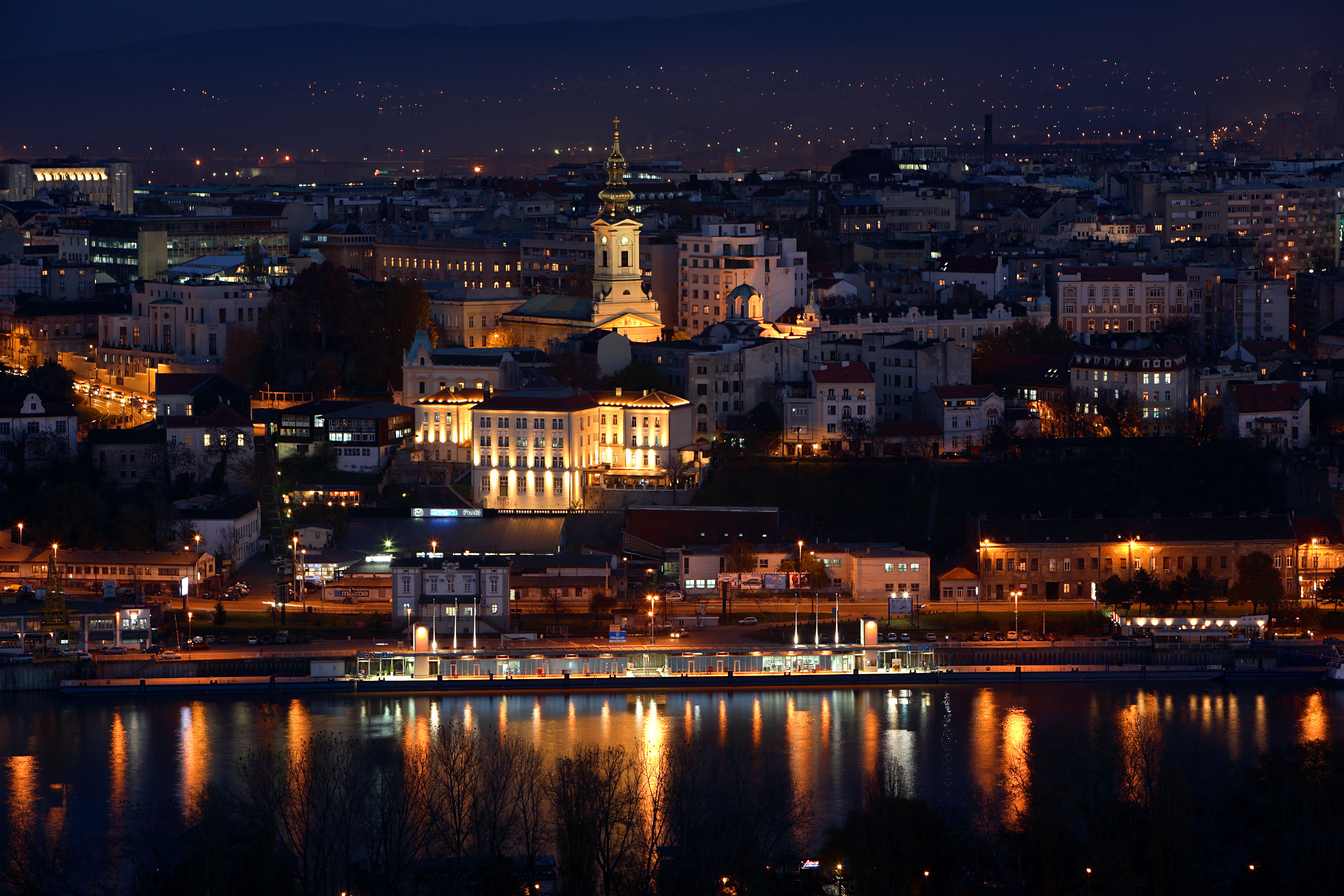
See map with details for arriving at the conference location:
HERE
Conference participants are fully responsible for arranging their accommodation and travel to Belgrade.
Conference Program
The Conference Agenda is available in the right sidebar of this page.
The extensive conference program with abstracts and available draft papers is accessible below by clicking on the panel number tabs and individual presentations.
Keynote Presentation
Itai Sneh (City University of New York, USA)
Cold War and Helsinki: Eastern Europe Defined by Human Rights
Abstract:
This presentation will make three arguments concerning political dimensions of the Cold War:
1. The promotion and protection of human rights served as a unifying, rallying point for Eastern Europeans during the Cold War. Indeed, human rights advocacy was effectively a form of transnational anti-Communism.
2. Political considerations of who was in the Warsaw Pact (such as Czechoslovakia and Poland) and who was not (such as Albania, Romania and Yugoslavia) strongly affected how Eastern Europe was defined.
3. The 1975 Helsinki Final Act, where the Cold War human standards became concrete, articulated, and subsequently proclaimed, was the symbolic and substantive embodiment for this pattern.
The August 1, 1975 Helsinki Final Act was a diplomatic compromise reached by Kissinger with the Soviets through the Conference of Security and Cooperation in Europe in the spirit of détente. It introduced a less than subtle quid pro quo: the Communists pledged respect for universal human rights such as civic liberties, but without specific mechanism for enforcement in particular countries. In exchange, the West recognized the permanent territorial integrity and political legitimacy of these oppressive regimes in Eastern Europe. Warsaw Pact leaders feared demands to reverse its accomplishments from the emerging continental powerhouse, West Germany, and from the descendants of displaced refugees, with potential American patronage. Local groups in Communist countries were inspired by the mention of civil liberties as a rallying call for action. One grassroots organization was Charter 77 in Czechoslovakia, formed by human rights defenders – including playwright Vaclav Havel – in a manifesto on January 1, 1977 to monitor the faulty observation of the Helsinki standards proclaimed exactly seventeen months earlier. Another manifest was the Solidarity movement in Poland. Organized by Lech Walesa, an electrician in Gdansk’s Lenin shipyards, felt empowered by such civic liberties as the rights to freedom of expression and forming political parties. Thus, Helsinki triggered a process of verification that was internal,and that built trust in the veracity of international concern and subsequent protections for oppressed people under Communist regimes.
Itai Sneh is Associate Professor of History for World Civilizations, Human Rights, and International Law at the History Department, John Jay College, City University of New York.
He completed his M.Phil. and doctorate at Columbia University. He also holds a law degree and a master’s degree in Eastern European Jewish History from McGill University in Montreal, Canada, and a BA in Jewish History from Hebrew University in Jerusalem, Israel. His research interests and resulting publications include articles on human rights, U.S. politics, American foreign policy, terrorism, the Vietnam War, and the Middle East. He is the author of The Future Almost Arrived: How Jimmy Carter Failed to Change U.S. Foreign Policy, Studies in International Relations, Peter Lang, New York, 2008.
- Cold War and Helsinki: Eastern Europe Defined by Human Rights Local groups in Communist countries were inspired by the mention of civil liberties as a rallying call for action. One grassroots organization was Charter 77 in Czechoslovakia, formed by human rights defenders - including playwright Vaclav Havel - in a manifesto on January 1, 1977 to monitor the faulty observation of the Helsinki standards proclaimed exactly seventeen months earlier. Another manifest was the Solidarity movement in Poland. Organized by Lech Walesa, an electrician in Gdansk's Lenin shipyards, felt empowered by such civic liberties as the rights to freedom of expression and forming political parties.Itai Sneh, John Jay College, City University of New York
The Persisting Imaginary Dichotomy of Eastern/Western Europe with Its Axiological Categories and Perceptions
- Re-Inventing Eastern Europe or Re-Inventing Europe?ontrary to this position, I address the intellectual and literary imagination of the European margins from within and conclude that the inhabitants of the imagined geopolitical entity of Eastern Europe, to which I also belong, are bound to have more differentiated, even though at times colliding perspectives. I compare essayistic, historical, and fictional works to do justice to the different perspectives in mapping the European continent, and I also posit the questions of cultural and political belonging to the European continent in the context of spatial theory, as elaborated by Irit Rogoff and Edward Soja.Ana Foteva, University American College, Skopje, Macedonia
- The Angel of Nostalgia Trapped between East and WestThe paper focuses on the problem of East and West and the Central European paradigm as constructs for Western Europe to define itself against a distorting mirror where cultural, political and historical opposites of the hegemonic western story are contained. To address this issue, the article chooses to explore the literary works and debates of some writers trapped between East and West, always being pushed to the East, willing to flee to the West or rather opting for a vanishing point to liberate themselves from an etiquette in which they cannot recognize themselves.Marta Fernàndez Soldado, Universitat de Barcelona. Spain
- Ukraine’s East-West Regional DivisionThe Ukrainian East-West division constitutes a part of the European East-West dichotomy. This dichotomy was well retranslated in Ukrainian settings. The paper aims to deconstruct the myth of the infamous Ukrainian East-West division. Apart from that, taken into the account the current developments, it is important for the author to show how Eastern Ukraine with its region Donbas have been trapped to the stereotypical Orientalism in the political and intellectual discourses and how the notion of Eastern Ukraine have been shifted eastwards in the course of war and reduced to the Donbas region.Zhanna Mylogorodska, University of Leipzig, Germany
Visual Urban Transformations: Transition and Change in Urban Image Construction in Central and Eastern Europe
- London – Labyrinth, Initiation or Trap for Eastern Europeans: Reflections in Bulgarian and Latvian Prose (A. Popov and V. Lācītis)TGreat Britain with its welcoming immigration policies in the early 21st century was very expedient for Eastern Europeans and thus becoming one of the main destinations for seekers of a better life. London as one of the European meccas of multiculturalism rapidly obtained Eastern European features and today can be considered an important Eastern European city as well. Although the communities at the new location are shaped based on ethnic and linguistic properties, a common mentality from socialistic past creates a wider cultural group of Eastern Europeans.Ojārs Lāms, University of Latvia, Riga, Latvia
- The Absent Presence Of Abandoned Industrial Spaces Of Belgrade: A Semiotic Study Through Photographic ImageryThe study focuses on the abandoned industrial spaces in Belgrade as the examples of modernities in transition. Mainly two study areas are chosen that have marked the development of industrialization starting from late 19th century on the confluence of two rivers (Sava and Danube). The discontinuity in urban development and degradation of initiated projects in Belgrade, throughout the 20th century, could be ascribed to turbulent social and historical processes, radical shifts in political course and ideological changes, which left behind a decaying fabric of built environment, empty industrial spaces with the absence of content, function and programme.Evinc Dogan, Okan University, Turkey
- Make Macedonia Great Again! The New Face of Skopje And The Macedonians’ Identity DilemmaFrom 2010, the Macedonian government has undertaken a project called “Skopje 2014”, aimed to renew the capital city Skopje not only by adopting neo-baroque style and building statues but also renaming the major streets, the stadium, the airport and the schools after the names of alleged ancestors that lived in “a glorious past”. Considering the turbulent past of the Macedonian nation-building, the paper seeks to analyse more in detail this “making Macedonia great again” by means of architecture, paying particular attention to the new state-promoted ‘ethnogenesis’ and the national narratives attached to it.Arianna Piacentini, University of Milan, Italy
- Politicization in Public Space in Bosnia-HerzegovinaThis paper focuses on one public space that is simultaneously an NGO and a cafe, thus fusing the international and the local, built in a site destroyed during the war and reconstructed by youth activists to be an inclusive site of artistic development and active citizenship. In the context of national and cultural fragmentation in Bosnia-Herzegovina, the appropriation of space in Mostar and the conversations that converge around this phenomenon illuminate how young people place themselves within the polarizing forces in their country.Dilia Zwart, Independent Researcher, Brussels, Belgium / Harvard College, Cambridge, USA
Art as Cultural Diplomacy: (Re)Constructing Notions of Eastern and Western Europe
- Cultural Resource of Diplomacy (Russian-Polish Experience)We should not erect, with our own hands, a wall between our cultures and so, between our countries. People from the arts and culture field of different countries belong to a single community, a Single Territory of Arts. Art should not directly fall under the policy area, should not become an instrument of manipulation. But it does not negate the art’s involvement in urgent contemporary processes. Closed borders and cancelled projects just deepen misunderstanding between us, and narrow cultural horizons.Natalia Goncharova, Art Historian and Curator, National Center for Contemporary Art, Moscow, Russia
- The Role of Art in Cold War Diplomacy in Yugoslav – US Relations 1961-1966During the 1960s, culture was often (sometimes unwittingly, other times intentionally) infused with the politics of the Cold War. This paper will highlight the specific role of former Yugoslavia in America’s cultural Cold War programme and Yugoslavia’s frontier position between East and West in geographical, ideological and socio-political terms. America’s foreign and cultural policies will be correlated with Yugoslavia’s government active roles and strategies and its art world in international cultural relations. The analysis will start with the year 1961, when Yugoslavia adopted a new strategic position of “nonalignment”.Stefana Djokic, The University of Edinburgh, UK
- Applied Social Art History as a Method to Aid Cultural And Social Integration Of CommunitiesThe paper will provide the conceptual and theoretical underpinnings of Applied Social Art History as a method for social/cultural integration. It will also provide an outline for practical application. Results from the pilot project evaluation carried out by Art for Integration and Social Transformation LTD (art: IST), which concluded on December 1st, 2016, will bring forward the insights generated from applying an integration lens to art workshops, as well as presenting the projected next steps for this body of work. Whilst the case study of this paper is rooted in the United Kingdom, Applied Social Art History as a method and the integration precedence is not limited and can be implemented in Central and Eastern Europe as well.Nirmalie Alexandra Mulloli, Art for Integration and Social Transformation, Oxford, United Kingdom
- East, West, Home Is Best: The Evolution of Slovak ColourColour is a myth; it is a lyrical layer of history and thus deserves more scholarly attention within Slovak history. My paper examines the importance of the context-sensitive colour in Slovak painting when considering the artworks by key Slovak painters such as Martin Benka (1920s), Ľudovít Fulla and Mikuláš Galanda (1930s), Milan Laluha (1950s) and Jarmila Mitríková & Dávid Demjanovič from the present day.Mima Chovancova, University of Brighton, UK
Readings of the Past: On Memory, Remembrance and Memorialization in Central and Eastern Europe
- European Politics of Memory and Legal Reinvention of History in CEEAfter summarizing the arising EU law of memory, the paper will zoom into two CEE countries, which have been recently under critique of the dramatic decline in the standards of the rule of law, that is Hungary and Poland. The paper will compare various legal engagements with historical memory in these two countries from the fall of communism until the recent commemoration practices and restrictive legislative attempts to control collective remembrance. Finally, the paper will analyze whether these mnemonic practices in Hungary and Poland are compatible with European standards of freedom of (academic) expression, assembly, non-discrimination, dignity, and ultimately, the rule of law.Uladzislau Belavusau, T.MC. Asser Institute, The Hague / University of Amsterdam, The Netherlands
- Looking in the Past of New Divisions: Art as a Living Archive in Post-1989 Serbia and RussiaBy focusing on the artistic output in Serbia and Russia after 1989, this paper provides a comparative analysis of how normative nationalist discourse created during and after the collapse of socialism in both nations has been challenged through art.this paper offers a new insight into social differentiation in both countries following the collapse of their respective socialist regimes. Focusing on creative strategies that have challenged normative discourses on national identity and national past provides a foundation for exploring how narratives of alterity have been created both from the inside and outside of both nations. In addition, this paper raises the question of what the rise of nationalist discourse, largely to the exclusion of any alternative, in post-1989 Serbia and Russia means today - an important topic, especially as the European Union struggles to keep this trend in check within its own borders.Iva Glisic, University of Tübingen, GermanyBiljana Puric, Independent Researcher, Belgrade, Serbia
- The Dispute Around the Soviet Monuments in Contemporary PolandAt the end of March, 2016, the then President of the Polish Institute of National Remembrance Łukasz Kamiński announced the launch of a nationwide project, which will remove Soviet monuments of Polish public places and transfer them to a special museum. It's about more than 500 monuments, which commemorate the soldiers of Red Army, who died during the firing Polish lands in 1944-45. To a large extent they were placed by the Red Army and were not the effect of spontaneous actions of the Poles. Łukasz Kamiński explained, that „[…] leaving the memorials is a consequence of not finished transformation with the beginning of the 1990s. It was a fatal mistake that for years gives the fuel used in propaganda and provocations against Poland […]”.Karolina Baraniak, University of Wroclaw, Poland
Genealogies of Othering: The Path from Alterity Making Practices through Myth and Religion to Secularism and Tolerance
- Somewhere In Between: Poland Within the Discourse of SecularismMany countries in Europe, although lastingly interwoven in the general history of the continent, cannot be inscribed in some of its allegedly common rhetorics, especially these concerning the terms of ‘modernity’, ‘secularism’, and so-called ‘development’. I will to focus particularly on the case of Poland and prove that Polish experience of the ‘secular’ cannot be equated with its Western European version. I argue that the difficulties, which our continent encounters nowadays, should not be explained through the monolithic universalism of the ‘(post-)secularist’ vocabulary, but ought to be described from more individual and bifurcated perspectives.Marek Susdorf, Utrecht University, The Netherlands
- The Genealogy of the Construction and Stigmatization of the Other: The Case of Orthodox Serbs and South Slavic MuslimsThe society creates not only socially acceptable patterns, but also those that are unacceptable. In this paper, we will try to identify the point in time when the South Slav Muslims were actually defined as the archetypical Other. After that, the aim of this paper will be to provide a detailed analysis of the genealogy of the development of an ideology which served to rationalise its hostile attitude, which eventually, on a number of occasions in recent history, resulted in genocide and ethnic cleansing perpetrated against the South Slav Muslims.Ivan Ejub Kostić, Faculty of Political Sciences, University of Belgrade, Serbia
- The Magic and the Secular in European Politics: Case Studies from RomaniaWhat are the roles discursively assigned to the occult and the secular and how can we deconstruct them to make sense of why people choose or dismiss religious identities and practices? My work analyzes ideological West-East divides by looking at the scholarship produced by anthropology on areas largely accepted as ‘Eastern European’, ‘socialist’ and ‘post-socialist.’Alexandra Cotofana, Indiana University Bloomington, USA
- Fighting the Trope of the Tolerance Deficit: An Ethnography of Tolerance Proponents in SlovakiaIn this paper, I will lay out the context for engaging with tolerance in Slovakia and present my upcoming project as well as my approach to the field. I take an individual approach to the emergence of political subjects, assuming that modes of internal conversation or heteroglossia may allow individuals to hold contradictory views, ultimately leading to the coexistence of distinct, but intricately linked discourses on tolerance on a public scale. The project aims to enhance the current political debate on populism and nationalist movements in formerly socialist countries.Eva-Maria Walther, Graduate School for East and Southeast European Studies, University of Regensburg, Austria
Central East European Economies: Trade, Development and Structural Change in the Region
- Services Trade and Structural Change in the Western BalkansThis paper investigates the development of the services sectors in the Western Balkans both from the point of view of their international integration (EU and WTO membership and accession processes) and from the point of view of the structural changes that are taking place in their economies. The analysis is based on statistical data gathered from various international sources (UNCTAD, WTO and World Development Indicators databases). The paper concludes that in order to achieve a higher level of economic development, these countries need to develop the production and international trade of higher value-added services sectors.Ivana Prica, Faculty of Economics, University of Belgrade, SerbiaWill Bartlett, London School of Economics, UK
- Geopolitical Changes And The State Of The Croatian Economy: Examples Of High-Tech Companies’ TransitionsIt is argued in this paper that the position of the Croatian economy was and is heavily determined by geopolitical factors, contrary to analyses that emphasize cultural, ideological and economic policy factors. Sewell's emphasis on global contingency and his plea for eventful sociology i.e. on analysis of unpredictable events that are able to change durable structures is followed in this paper. It is argued that historically important events have been changing the structure of the Croatian economy in the last hundred years. Path-dependency of companies is compared with path-dependency of their sectoral counterparts in CEE countries. It is also presented how the entrance in the European Union is again changing trajectories of Croatian high-tech companies.Nikola Petrovic, Institute for Social Research in Zagreb, Croatia
- Good Apple, Bad Apple? How Nation Branding And Other Trade Factors Challenge Serbian Food Trade to Reinvent ItselfThis study examined whether there are “hidden” trade obstacles that are observed by the Serbian fruit industry but not analysed and sufficiently discussed within research. By examining the Serbian framework conditions for producing high value and internationally competitive fruit products, a questionnaire was developed which was discussed with the Serbian direct and indirect participants of the Fruit Value Chain. Methodologically, the research work is oriented towards the Multi-strand Conversion Mixed research design as described by TEDDLIE and TASHAKKORI.Eli Wortmann-Kolundžija, Center for Development Research, University of Bonn, Germany
- General Prosperity: Is Wellbeing a Human Right?Is Wellbeing a Human Right? If so: what do politicians, economists and other social scientists so far miss and, thus, need to learn, in order to be able to successfully work for that right? What do citizens have to learn, in order to claim, achieve and secure that common right for themselves and their countries?Gerhard Eichweber, Silva Plan / Value Group, Switzerland
The Process of Europeanization in CEE: Crisis, Migration, European Integration and Possibilities of Regional Cooperation
- Migratory Flows and Self-Governing Rights: A New Paradigm for the Post-Communist Eastern EuropeMigratory phenomena are currently challenging the sphere of human security and democracy in the post-Communist Eastern Europe, in turn affected since the collapse of Soviet Union and Yugoslavian regimes by the fear of proliferation of ethnic and religious violence and instability promoted by national minorities. Since the spring 2015, the wider areas constantly deal with the humanitarian migrants’ crisis through their geographical corridors, exacerbating the public realm among locals and newcomers. Meanwhile, human rights abuses, political implications for EU candidate states, as well as selfish boundary policies and stubborn nationalisms, take already more and more place. Hence, what kind of scenario in terms of contribution to general securization of interstate-minority relations the migration will shaped? Migratory flows seem to be the new challenge for the region. Therefore, could such phenomenon negatively discourage the idea of self-governing rights and territorial autonomy to national minorities into the region?Francesco Trupia, Sofia University, Bulgaria / Research Fellow at Alpha Institute of Geopolitics and Intelligence (Italy)
- Media Analysis Of Political Crisis and the Enlargement Policy of the European Union: Impact on European Integration Processes in MacedoniaThe European scenario for the Macedonian case is completed with the meeting of the European Council in December 2014, without a discussion of the sixth European Commission recommendation to open accession negotiations to the European Union without the issue of the Greek blockade. In March and September 2016, Macedonia received the seventh and eight recommendation conditional on the successful completion of the political crisis and early legislative elections. Through the analysis of media content, interviews with scientists and experts in European integration processes, this research confirms the thesis that the institutional and political crisis in the EU mediated by the unresolved Greek blockade affects the integration processes of Macedonia, or a date for starting negotiations accession membership.Liljana Siljanovska, South East European University, Tetovo
- A Discussion of Regional Cooperation in the Southeast Europe Around the Black Sea in the Context of Subregionalism and InterregionalismThe Black Sea regionalisation process is influenced by different but mainly three core regional actors. BSEC is a Turkish initiative in an area which is widely considered to be in Russia’s sphere of influence. Moreover, the region is in the Eastern Neighbourhood of the EU, which has been bidding for a core role. In that regards, this paper will discuss the Black Sea regionalisation process in the context of the relationship among the three core actors: Russia, Turkey and the EU and aim primarily at an empirical assessment of what the EU has done to promote regionalism in the wider Black Sea area.Mukhtar Hajizada, Jean Monnet Chair, Khazar University, Baku, Azerbaijan











